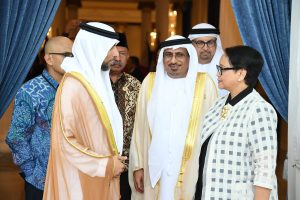China’s expanding ties with the United Arab Emirates (UAE) have been widely reported. The same goes with China’s growing cooperation with Indonesia, as well as the latter’s rapprochement with the UAE, which in recent years has been consummated with a myriad of cooperation agreements. What is less known is that these various strands of bilateral cooperation have given birth to the growing trilateral relations between Indonesia, China, and the UAE.
The first sphere in which the trilateral relations have emerged is on COVID-19 vaccines. In 2020, Indonesian Foreign Minister Retno Marsudi stated that the Indonesian government had signed an agreement with China and the UAE for the procurement of 20-30 million doses of vaccine for use by the end of 2020 and for securing an estimated 290-340 million doses by 2021.
Moreover, in August 2020 a consortium led by companies from the UAE and China offered to collaborate with Indonesia on coronavirus vaccine research and manufacturing. The agreement, which was signed by Group 42, an artificial intelligence and cloud computing business based in the UAE, and Sinopharm, a subsidiary of China National Biotech Group, was the first phase III clinical trial of a COVID-19 vaccine anywhere in the world.
Clinical trials were being conducted in Abu Dhabi under the direction of the city’s health department. There was later talk of the collaboration being expanded to include Bio Farma, Indonesia’s state-owned vaccine manufacturer.
Jodi Mahardi, a spokesman for Indonesia’s Coordinating Ministry for Maritime Affairs and Investment, affirmed that the possibility of collaboration was the result of Indonesia’s close ties with the UAE and China, as well as Beijing’s strong ties with Abu Dhabi.
Besides vaccines, the development of trilateral relations can also be seen in infrastructure investments. In September 2021, the UAE officials visited Indonesia to discuss the potential construction of a resort in a 40,000-hectare swamp area in Singkil in Aceh, an investment worth $500 million. It was reported that the UAE officials’ visit to Jakarta was accompanied by Chinese representatives who were interested in becoming involved in the investments.
The potential strengthening of this trilateral relationship can also be felt in Indonesia’s plan to move its capital city. It has been confirmed that the UAE is willing to provide an injection of funds for the costly construction of the new capital Nusantara.
According to the head of Indonesia’s Investment Coordinating Board, Bahlil Lahadalia, the UAE will invest $10 billion in the construction of the new city. The investments will be directed into three sectors, namely infrastructure, information technology, and green industrial areas. In addition, Jakarta and Abu Dhabi have also agreed to cooperate on environmentally-related projects, focusing specifically on mangrove preservation.
At the same time, China has also expressed its interest to invest in the new capital city in various sectors, including infrastructure, raw materials, transportation infrastructure, and green industrial initiatives. Given that planned UAE and China investments involve similar or overlapping sectors, it is likely that Indonesia’s new capital city will involve a good deal of trilateral cooperation between the three nations.
The emergence of this pattern of trilateral cooperation is not surprising. As mentioned earlier, China-Indonesia relations have experienced significant growth in recent years. Indonesia sees China as an important economic partner, while the former is considered by the latter as a crucial country for the realization of the Belt and Road Initiative (BRI).
Given that Chinese investments in Indonesia have elicited increasing negative sentiments due to the long-history of anti-China sentiment in the country, the negative impacts of Chinese investments, and strong local opposition to China’s Xinjiang policy, Indonesia sees the UAE’s involvement in the growing China-Indonesia relations as a way to balance out these local perceptions.
This has been affirmed by Luhut Pandjaitan, Indonesia’s coordinating minister of maritime and investment affairs, who in making calls for Indonesians to end any acts of xenophobia toward China and its people and said that “people should not be angry when the cooperation between Indonesia and the UAE would also include China.”
At the same time, China also has growing ties with the UAE, which Beijing views as one of the gateways to the wider Middle East. It is important to note that since the BRI was introduced in 2013, Beijing has also expanded its political, economic, and cultural footholds in the Middle East, which sits astride the African and European components of the BRI. As a matter of fact, Xi Jinping this month affirmed the importance of Middle Eastern countries in side meetings with a number of Arab leaders during the opening ceremony of the Beijing 2022 Winter Olympics.
Thus, collaborations with Jakarta and Abu Dhabi are seen by Beijing as a way of killing two birds with one stone, allowing it to strengthen ties with two important partners simultaneously.
At the same time, the UAE, with its “Look East” policy, has been trying to diversify its foreign policy by moving away from its traditional Western partners to consolidate ties with growing Asian economies. Besides responding positively to China’s growing involvement in the Middle East, the government in Abu Dhabi has also expanded its partnership with Indonesia. Indonesia-UAE cooperation has experienced quite rapid development in the economic, social and cultural fields. The two nations signed 16 memorandum of understanding in 2020, which were followed by various agreements last year.
Based on the above factors, it is highly likely that the trilateral cooperation between Indonesia, China, and the UAE will continue and expand into other fields.
































